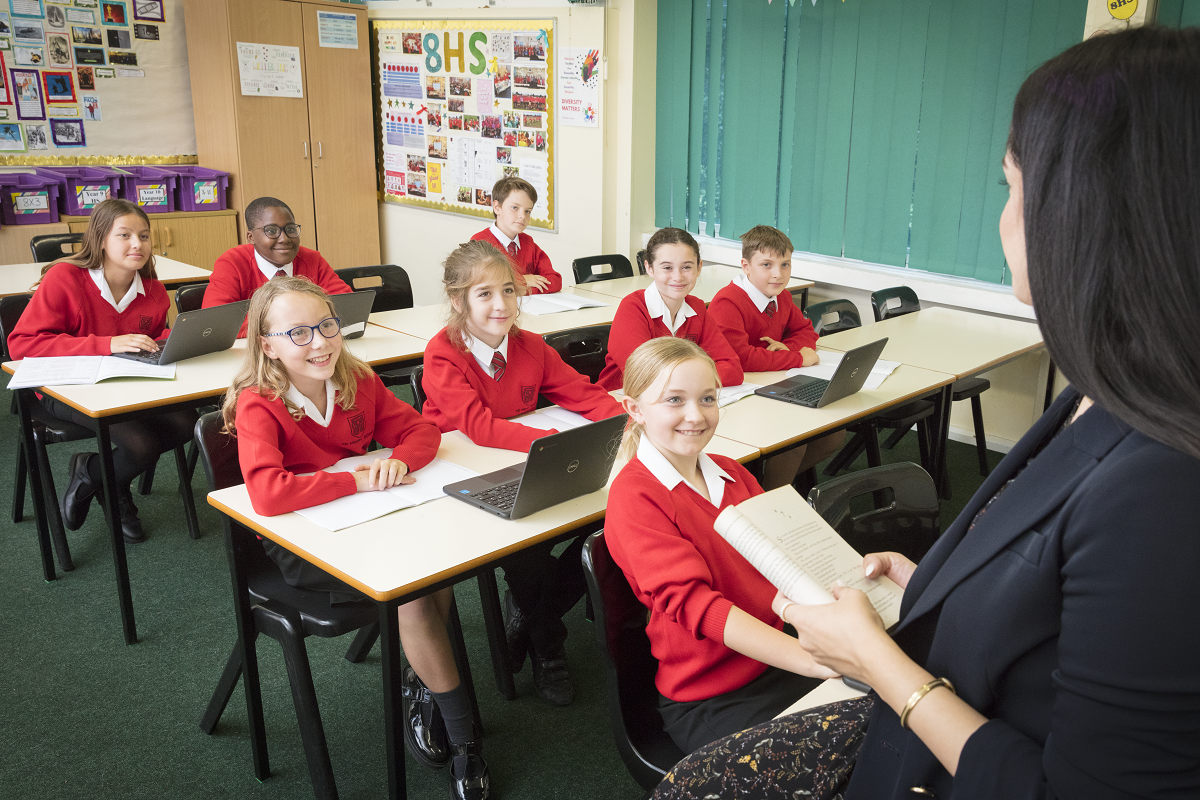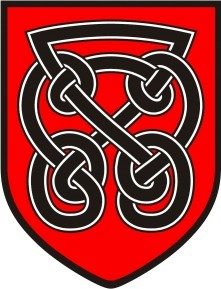
The English Department aims to offer all students a range of experiences, designed both to improve their control of English in its written and spoken forms and to understand more about the diverse world that we live in, through the study and enjoyment of literature. This is at the heart of our work. We aim to empower young people with the knowledge and skills they need to make sense of the complex and ever-changing world that they meet beyond school.
Curriculum
Key Stage 3
Students begin Year 7 being taught in their form groups in English. As they progress in to Year 8 and then into Year 9 they are placed in to new groups and we track and monitor students’ progress carefully to ensure they are always in a learning environment where they can thrive.
Throughout their study at KS3 all students study literature written before 1914, including Shakespeare, helping to build up their confidence and resilience at dealing with more challenging texts at KS4. They are expected to develop their own reading tastes through regular use of the Library. Students develop their competence in different written forms, including newspaper reports, letters, diaries, poetry, stories and close textual analysis in preparation for their half termly assessments. We follow the National Framework for English and make regular use of a range of learning activities to support, stretch and challenge our young people. Throughout each half term students ability in Reading and Writing will be assessed through a range of tasks linked directly to the skills they will be examined on in KS4.
All students are offered the opportunity to be involved with external providers, such as writers, poets, theatre groups and trips. We work closely with the Special Educational Needs department to ensure the quality of our materials is appropriate for our most able students as well as those few who struggle. Homework is set once per week through Google Classroom and we always try and set work that is an extension of what they have been doing in the classroom to broaden their understanding of different topics and skills.
Key Stage 4
Year 10
Most students will have the opportunity to attain a qualification in both English Language and English Literature and we follow the AQA specification for both of these. To support our vulnerable students, we offer them the opportunity to study English Functional Skills alongside English Language to help reinforce the most important reading, writing and spoken language skills. Throughout the course, students will study both Language and Literature (or Functional Skills) side by side to allow students to see how the two qualifications complement one another, but to also allow them to experience a varied learning experience day-to-day.
Throughout the year, students will cover a range of reading and writing skills for their English Language exam. Students will be expected to cover simple information retrieval, summary, language analysis and comparison for the reading elements of their exam. For writing, it is vital that students focus carefully on the technical aspects of their writing (spelling, punctuation and grammar) as well as developing their vocabulary and style to suit a range of audiences and purposes.
For Literature, we split the texts over the two year course. In Year 10, we cover the 19th Century novel (currently The Strange Case of Doctor Jekyll and Mr Hyde or A Christmas Carol), a range of poetry from the ‘Power and Conflict’ poetry anthology set by AQA and a Shakespeare text (currently Macbeth or Romeo and Juliet). For the study of Literature students are expected to understand texts in context and we encourage students to do wider reading and research to inform their study.
Year 11
The GCSEs assess students through 100% examination, through a total of four examinations totalling 7 and a half hours.
Building on the skills they’ve learnt in Year 10, students will continue to cover both Literature and Language in Year 11. They will revisit all texts studied in Year 10 for Literature, as well as finishing the study of the poems not covered in Year 10 and another modern text (currently Animal Farm, An Inspector Calls or Lord of the Flies).
For Language, students will continue to refine skills needed to craft different types of writing and be exposed to a wide range of literary non-fiction and fiction from a range of 19th, 20th and 21st century texts to practice the skills needed for their two language papers.
Key Stage 5
A Level English
English Literature
We currently offer English Literature at A Level and follow the AQA Lit A specification. Students follow the straight A Level course for 2 years (no AS offering) and their final grade will be determined by their performance in two exams, both worth 40% each, and a final non-exam assessment (NEA) worth 20%. Students will study Love through the Ages and Texts in Shared Contexts: WW1 and its Aftermath, as well as the core content for the course.
For their Love through the Ages element, students will study ‘Measure for Measure’ as their core Shakespeare text, supported by their study of the AQA anthology of love poetry as their pre-1900 text and Scott Fitzgerald’s ‘The Great Gatsby as prose. For WW1 and its Aftermath, students will study Joan Littlewood’s ‘Oh What a Lovely War’ as their set, core text, along with a selection of Wilfred Owen poetry and ‘A Long Long Way’, a modern novel by Sebastian Barry. Both elements contain unseen extracts from prose or poetry as part of the exam.
Their non-examined assessment is designed to allow students to read widely, to choose their own texts (if appropriate) and to understand that contemporary study of literature needs to be informed by the fact that different theoretical and critical methods can be applied to the subject. This area of the course provides a challenging and wide-ranging opportunity for an introduction to different ways of reading texts and for independent study.
English Literature and Language
From September 2022 we will begin our new AQA A-Level Literature and Language course. Students follow the straight A Level course for 2 years (no AS offering) and their final grade will be determined by their performance in two exams, both worth 40%, and a final non-exam assessment (NEA) worth 20%.
For their Telling Stories component students will study a wide range of non-fiction from the AQA Paris Anthology, Margaret Atwood’s The Handmaid’s Tale as well as a collection of poetry by Carol Ann Duffy. For their Exploring Conflict component students will study F. Scott Fitzgerald’s The Great Gatsby and Shakespeare’s Othello. The exams are made up or a range of reading and writing components and are a mixture of open and closed book.
Their non-examined assessment is designed to allow students to read widely to conduct a personal investigation that explores how a specific theme or technique is explored in both literary and non-literary discourse.
Enrichment
We work hard to provide an exciting and challenging English experience in many different ways. Working closely with the Library, we often provide students with the opportunity to work with visiting writers and poets, as well as setting up book groups and a very successful Carnegie Shadowing Group to review the shortlisted authors.
We offer a very successful ‘Youth Speaks’ program for students who are interested in public speaking. In previous years we have entered a number of teams in to the Rotary Club Youth Speaks competition and we have, on numerous occasions, progressed to regional finals.
In addition, wherever possible, we place huge importance on students seeing theatre productions of not only the texts that they are studying, but any linked production to expose them to this wonderful cultural experience.
Careers
The skills learnt through the study of English allow students to choose from many different employment sectors and occupations. Many successful English students follow careers in management or administration, either for a company or for the Government. Teaching and other education work are the next most common career destinations. A large number of English students choose to work in a creative field, such as writing, publishing, PR or acting. However, there is huge variety in English-related career choices: legal, financial and sales positions are also popular.
A strong grasp of English underpins all careers. Communication skills learnt in English are used in all walks of life, when dealing with clients, customers or just communicating with colleagues effectively.
Staff
- Dr Harriet Lacey – Head of English
- Ms Catherine Ellis –Assistant Head of Department i/c of Key Stage 3
- Miss Alice Anderson-Bonner – 2nd in English
- Miss Katie Dolling – Teacher of English and Assistant Headteacher
- Ms Christine Farman – Teacher of English and Lead Practitioner for Early Years Career Development and CPD
- Mrs Laura Braithwaite – Teacher of English
- Mrs Cheryl Hamer – Teacher of English and SEND
- Mrs Kathryn Jones – Teacher of English
- Mrs Emma Stevenson – Teacher of English
- Miss Husna Shah – Teacher of English
- Mrs Emily Elmore – Teacher of English
